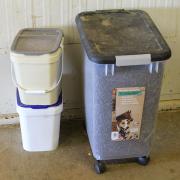DIAGNOSIS
Once a more thorough neurologic examination is conducted by the veterinarian, s/he may take one or more blood samples for testing. There is the possibility of false positives or false negatives, so your veterinarian may perform more than one test.
Upon reaching a diagnosis, the appropriate treatment protocol will be prescribed. The drug choice and length of duration will depend on the severity of symptoms.
With a more acute, hard-hitting disease like the neurologic strain of EHV-1 or West Nile, treatment revolves around supportive care, fluids and anti-inflammatory drugs. If the horse is recumbent (unable to stand), the prognosis is usually very poor.
For EPM cases, an antiprotozoal drug will be prescribed for a minimum of 30 days. Often, this is not a long enough duration to prevent a reoccurrence of the disease. A more cautious approach would be to treat for 30 days after you stop seeing improvement. This will help the immune system be able to fight the infection on its own.
Alternative therapies are available that may be used in conjunction with or instead of drug therapies. They include supplements such as the DePaolo Equine Concepts Neuro Kit that boosts the immune system and help fight infection. Other recommendations are acupuncture, hyperbaric chambers and IV Ozone.
PREVENTION
A healthy immune system is the first line of defense against infection. This is influenced by feed, supplements, immunostimulants, vaccinations and stress. Let’s walk through these one at a time.
There seem to be thousands of feeds to choose from. Those that are the healthiest will NOT contain molasses, corn, soy, by-products or middlings. These can be hard to digest, usually contain high amounts of herbicides, and may induce an allergenic response from the immune system. It is difficult to handle an inflammatory diet and the invasion of viruses, bacteria and protozoa all at the same time.
In conjunction, 70% of the immune system is contained in the digestive tract. Therefore, it is important to make sure your horse does not have ulcers. A daily digestive conditioner can be very helpful, especially for performance horses hauling and competing.
Another beneficial supplement is L-Lysine. It is key to calcium absorption, building muscle protein, boosting the immune system and supporting the body's production of hormones, enzymes, antibodies. This proactive approach will help your horse when exposed to infectious illnesses while under stress.
An immune stimulant activates a non-specific response to target any pathogen that may be recognized as a threat. Because of this rapid and general response, immunotherapy is a valuable addition to those horses that travel and compete on a regular basis. These stimulants are given IV and three doses are needed three days apart starting eight days before you leave.
It is prudent to make sure your horse has been adequately vaccinated in the past with the core vaccines. However, not all neurologic disorders can be prevented with vaccines. It is NOT recommended to vaccinate within the 21 days prior to major stress like hauling, competition, change of stabling environment and surgery (including castration). The immune system is busy trying to mount an antibody response to the vaccine(s), so it will be ill equipped to handle actual infection. It is also crucial to not over-vaccinate, as this can deplete the immune system as well.

It is hard to avoid stress with a competitive barrel horse. Your best option is to limit the amount of stress as much as possible. Provide stalled horses turnout every day. Avoid major medical and dental treatments immediately prior to competitions. Maintain a consistent feed source and monitor water consumption, especially during travel.
Finally, to help prevent EPM, it is important to make sure your feed is not exposed to fecal contamination from opossums and cats. It is known that EPM is caused by a horse ingesting protozoa from infected feces. Store grain and supplements in closed containers. Make sure your hay does not have dirt in it. If the baler was very low to the ground, there is a good chance it could pick up small animal feces.
Neurological diseases present significant challenges in diagnosis and prevention. Early detection is key as the longer it takes to eliminate the infection, the more irreversible damage it can cause. By taking note of the small changes in your horse and administering a basic neuro exam, you may be able to help pinpoint a problem before it gets too severe and the sooner you can get your horse on the road to recovery.

